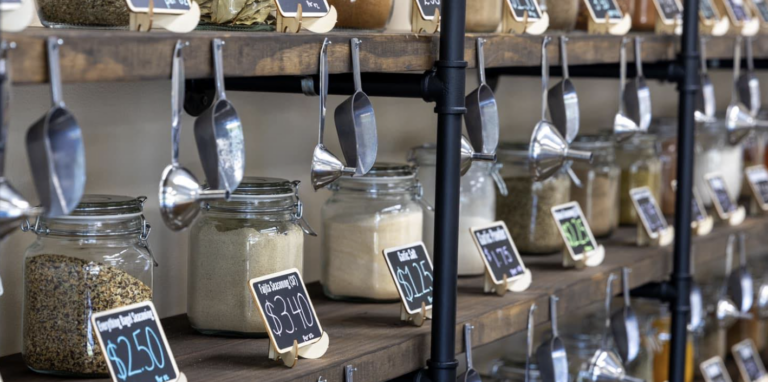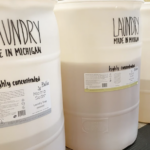
- Kim Kisner
- Business
- 10/15/2024
Metro Detroit Refilleries Help Fill Gap in Sustainability Practices

The concept of refilling containers to reduce plastic waste and promote sustainability is taking hold in many forms. From pop-ups to brick-and-mortar, Refill Shops, known as refilleries, are becoming more prevalent.
To find out more about the industry, SBN Detroit interviewed three local business owners: Corey Thompson, founder of Red Oak Refillery with installations in two locations; Jessica Cichowlas, owner of BYOC with brick-and-mortar locations in Ann Arbor and Plymouth, and Ashby Cummings, owner of MI-Fillosophy in Plymouth.
Q: Why a refillery?
Thompson: The inspiration for Red Oak Refillery came from my time working at Mama Suds, a brand focused on natural household cleaners. By 2021, we were seeing that roughly 30% of Mama Suds’ wholesale sales were directed to refilleries, predominantly on the East and West coasts.
This made it clear that there was a need for refill services in other areas as well. I started my business as a pop-up in Oxford in 2021, working part-time with my product set up at a coffee shop in Lake Orion. Setting up my products for a few hours each day gave me the opportunity to fine-tune my model. Instead of going the traditional brick-and-mortar route, I opted for a distributed model with installations in businesses that align with my values. I currently operate in two locations and am preparing to open a third, all while continuing my role at Mama Suds.
Cichowlas: I was a customer at BYOC, and the mission of reducing single-use plastic resonated deeply with me. The owner announced she was selling and I took over the two locations – Plymouth and Ann Arbor. My goal remains to uphold that mission, with a focus on sourcing from local family-run businesses that reflect our core values of sustainability and environmental responsibility.

Cummings: Mi-Fillosophy launched in February 2023 with a focus on food rather than lifestyle products, which sets us apart from most refill shops. I noticed a significant gap in the market, particularly after many bulk food stores shut down during the pandemic, and I wanted to address that gap by offering consumers a more sustainable way to shop for food.
Q: How has the community responded to the concepts of container reuse and the reduction of single-use plastics?
Thompson: The community response has been positive. For some, the idea of a refillery is novel and intriguing, though it’s a concept that has been common in places like India for centuries. Others have embraced the concept and seek out refill shops that align with their sustainability goals. Beyond that, the community also has actively sought me out for collaboration. For instance, Orion Oaks Elementary reached out for assistance in achieving certification through the Green Schools Program, and I got invited to speak at various summits and conferences. I think refilleries naturally become hubs for education and sustainable practices within their communities.
Cichowlas: The Ann Arbor community has embraced the refill shop a bit faster, I think, because the city has committed to sustainability goals – aiming for carbon neutrality by 2030. So, our store’s mission really resonates there. We’ve seen growing support in Plymouth as well, as more people begin adopting zero-waste practices.
Cummings: Customers have responded positively to a refill shop focused on food. Many like the option of purchasing smaller amounts or just what they need, which helps them avoid unnecessary waste.
Q: How has your clientele evolved over time?
Thompson: Our customer base continues to consist of both repeat visitors and newcomers. Some people actively seek out refill shops as part of their efforts to live more sustainably, while others are discovering the concept for the first time. It’s rewarding to see that growth and interest.
Cichowlas: We’ve developed a strong core of repeat customers, most of whom are local. However, we also see people traveling from further distances to stock up on refills, which is a testament I think to more people adopting sustainability practices.
Cummings: I’ve drawn customers from all around metro Detroit, but more and more refill shops are opening so people don’t have to drive as far to reach them, which helps from an emissions reduction standpoint and therefore is great. Many people from the local community here have become regulars.
Q: What challenges have you faced in operating a refill shop?
Thompson: One of the biggest challenges is that this industry is still relatively new, so we’re dealing with the typical obstacles any startup faces. Beyond that, educating the public about the refill concept is a continuous effort.
Cichowlas: Our main challenge is keeping our costs competitive with larger chains while maintaining our commitment to sustainability and local sourcing.
Cummings: For me, since my focus is food, managing food safety is a challenge. Keeping track of expiration dates and managing recalls. There’s also a need for constant education, particularly around bulk food safety, which some customers are unfamiliar with.
Q: What role do refill shops play in educating the community on sustainability?
Thompson: Refill shops play a critical role in community education, whether we intended it or not. Customers come to us with questions, and we find ourselves being the ones to provide answers. It’s an organic process — people look to us for guidance. I also think the local refill shops act as an example and a reminder to think more sustainably.

Cichowlas: I believe refill shops have an obligation to educate the community. From understanding which ingredients are safe to selecting products that align with sustainable values, we can remove a lot of the guesswork for people and it’s a service that’s important. Zero-waste can seem intimidating, so part of our mission is to make it accessible and achievable for everyone.
Cummings: The presence of a refill shop brings sustainability to the forefront of community awareness. Every day, whether it’s answering questions about recycling or helping customers choose eco-friendly products, we’re educating our customers.
Q: How do refill shops help reduce the carbon footprint?
Thompson: The impact is significant, even with small changes. Just using a container twice can make a big difference, and when that becomes a regular practice, the impact compounds. Many refilleries are also getting creative by offering services like recycling or food waste collection, further reducing the environmental footprint.
Cichowlas: We track the containers we save from landfills, and as of July 31, we’ve saved roughly 58,000 containers. We also have a free container shelf where customers can pick up used plastic containers to reduce reliance on recycling.
Cummings: Our primary focus is on reducing single-use plastic waste. In addition, refilleries cut down on the transportation needed for online orders, as we offer local solutions for products that customers might otherwise have to order from afar.
Q: How does product selection play into sustainability?
Thompson: I follow three main criteria when selecting products. First, products must be made in Michigan to reduce our carbon footprint and support local economies. Second, I prioritize women-owned businesses, and third, I make sure all products are as green, clean, and sustainable as possible to ensure they align with our environmental values.
Cichowlas: We source locally whenever possible, focusing on family-run businesses that share our commitment to sustainability.
Cummings: In our “Made in Michigan” section, we focus on local vendors who share our values. For food, we look at packaging and prioritize sustainable, organic options, such as reusable bags and brown paper.
Q: What does the future of refill shops look like?
Thompson: I believe the future lies in digital refilling, where we move beyond traditional pump-and-weigh methods. Again, this is such a new industry, I look forward to exponential growth as more and more people embrace what they can be doing individually and as a community to reduce our carbon footprint.
Cichowlas: Recycling can be confusing and hard to manage, so I think a mindset of reuse will grow.
Cummings: As refill shops become more prevalent I think people will begin to realize that sustainable shopping is easier than they might think. Refill shops will help people along that journey.
Be sure to subscribe to our newsletter for regular updates on sustainable business practices in and around Detroit.
Kim Kisner
- All
- Business
- Community
- Education
- Events

Unique Monique Scented Candles, a Detroit-based business founded by Monique Bounds., aims to produce candles and household products with clean ingredients and local supply chains. What began as a personal hobby during college has evolved into a full-time venture producing coconut oil and soy-based candles made with essential oils and locally sourced materials. SBN Detroit interviewed Bounds about launching a sustainable product line, sourcing challenges in Michigan, and...

Eastern Market Partnership, in collaboration with the City of Detroit’s Office of Sustainability Urban Agriculture Division, has announced $240,000 in grant funding to support Detroit-based farmers and farmer collectives. The grants will advance food access, climate education, sustainable land use, and economic opportunity, with priority given to Black- and Indigenous-led farms, youth-led initiatives, and projects rooted in historically disinvested neighborhoods. The recipients – ranging from cooperatives and community...

Citizen Robotics is a Detroit-based nonprofit that advances the use of robotics and digital manufacturing in residential construction, focusing on improving productivity, sustainability, and long-term affordability. Best known for its early work in 3D-printed housing, it explores how alternative construction methods and new financial models can reduce material waste, lower lifetime operating costs, and enhance the resilience of homes. SBN Detroit interviewed Tom Woodman, founder and president of...







